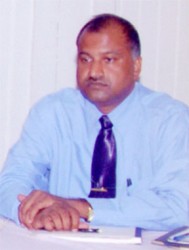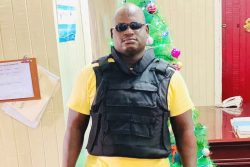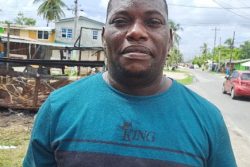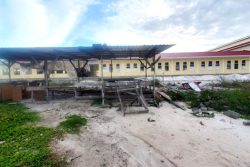Corentyne fisher folks have welcomed the noticeable decline in pirate attacks but remain fearful that the joint services will be ill prepared to protect them in the event of any possible resurgence.
Presently, they say they have seen no signs of aerial or river patrols, while pointing out that this may be because of the strained relationship Guyana shares with Suriname over the use of the Corentyne River for fishing.
For this year and the latter part of last year, police have received no reports of attacks. However, some fisher folk said that this was expected as the catch “has been very low” for months now.
Police last month credited the decline in pirate attacks to the resuscitation of the Inter-Agency Task Force on Piracy and the Inter-Agency Maritime Surveillance Programme. A release from the force had said that these have led to a number of initiatives which have “impacted positively” in the fight against piracy.

Commissioner of Police Seelall Persaud recently told Stabroek News that it is not only the police force that has been working to keep the situation under control but also the government, which had reactivated the multi sectorial committee that has been dealing with piracy. He added that it was in existence before but had gone dormant a while ago.
He said that coming out of that reactivation, there has been aerial surveillance in areas where fishermen operate. He said that a police force delegation recently met with the Suriname Commissioner of Police and other senior officers. “So we have also kind of renewed that relationship,” he said.
Persaud said that there would have been increases in patrols based on resources. He said that the Guyana Defence Force would have acquired vessels to do so. The police force, he said, has also been getting more resources. “Those patrols would have increased not only in the Georgetown Habour but also in different parts of Guyana. MARAD has been building some capacity as well,” he said.
“Generally, the trend has been a group of fishermen robbing fishermen. When they get arrested, it slows down and then it starts again until some arrests are made again,” Persaud added.
He said that the aerial patrols are being conducted periodically. “Surveillance is a covert operation,” he said, while assuring that work is being done to ensure that the fisher folks are safe.
‘Nothing major’
However when Stabroek News made contact with fisher folks in the Corentyne area, they painted a different picture.
Parmeshwar Jainarine, Chairman of the No. 66 Fisheries Co-op, acknowledged that there have not been reports of attacks for some time now, but he said, “Nothing major was done.”
“It just stop, ease up, because fish nah run. The catch was poor. Like the last four or five months, it’s only now it start pick up,” he said before explaining that the rain determines how much catch you get.
He also said that he has been seeing no patrols.
Jainarine, who has extensive experience in the fishing industry, pointed out that patrols cannot happen because Guyana cannot patrol in Suriname’s waters. “That is one of the issues we raise with them then…they can’t carry arms in Suriname waters. If the fisherman want to form policing group and patrol, we cannot carry arms, so it ain’t mek sense and the Guyana government cannot do that either,” he stressed.
He said that aside from the lack of fish to catch, the pirates, who are most times also fisher folk, may have grown conscience and have accepted that what they were doing was wrong.
“They know the asset wasn’t there and then when government change the new government was talking tough ’bout what dem gon do (and) we thought the pirate frighten because is a lot of military guys in the government,” he stressed. “The piracy just quit without no input from police or the coast guard,” he added.
On the issue of what is needed to ensure fisherfolks are safe at all times, Jainarine said that there is need for some system of joint patrols being put in place and police enforcing the amendments made to the law with regards to piracy.
He said that among the amendments are no bail for pirates and seizure of the assets of those found guilty. He said that these are on the law books but the police were not charging suspected pirates under the proper laws and often they would be granted bail by the courts.
“We don’t want it (the attacks), we glad that it nah come back (but) it’s like it just there waiting to raise it head again,” he said.
He pleaded for joint patrols involving personnel from both Guyana and Suriname and for the police to be educated about the amendments to the law. He said too that there is scope for government to do more.
Meanwhile, President of the Upper Corentyne Chamber of Commerce and Industry Krishnanand Jaichand also acknowledged “an ease of piracy” but questioned reports of aerial and river patrols. He said such reports cannot be accurate, at least in the Upper Corentyne area, due to the ongoing territorial issue between Suriname and Guyana.
Jaichand said that he had stated many times that in order to eradicate piracy, the two countries must work together.
“I haven’t seen any aggressiveness in addressing it. We are not putting systems in place. Nothing is in place right now,” he noted.







